Assessment Types
Technical, Personality, Cognitive, and Behavioural Tests
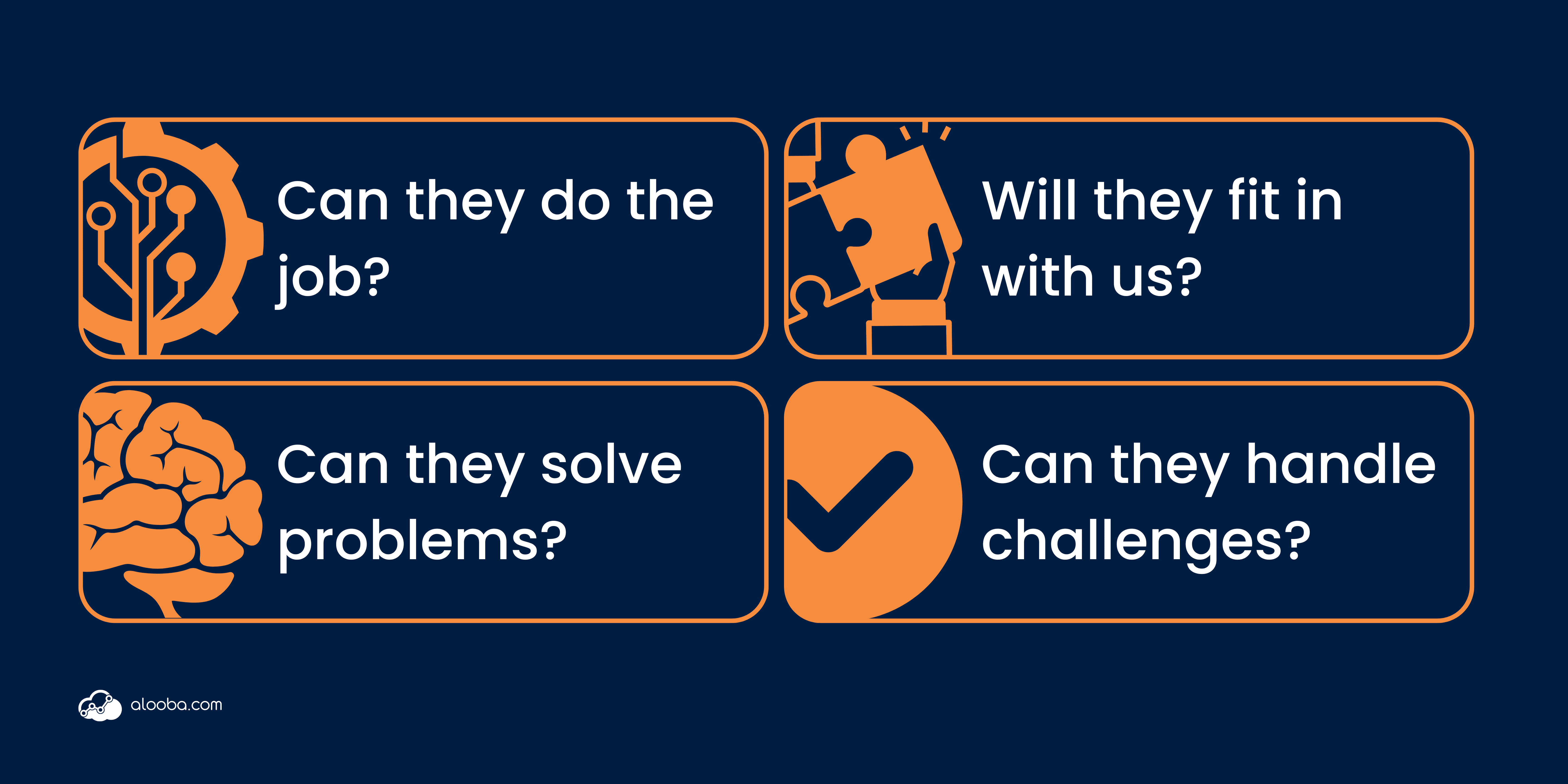
In the competitive landscape of talent acquisition, a multifaceted approach to candidate evaluation is essential. Technical skills are undoubtedly crucial, however, having comprehensive evaluation helps ensure candidates possess the additional qualities for long-term success. This is where various assessments come into play, encompassing technical, cognitive, personality, and behavioural evaluations.
Technical assessments delve into a candidate's proficiency in specific job-related skills, ensuring they have the technical expertise required.
Cognitive ability assessments, in contrast, assess fundamental thinking skills, problem-solving abilities, and adaptability, providing a deeper understanding of a candidate's intellectual capabilities.
Personality assessments offer insights into a candidate's traits, motivations, and work style, helping recruiters identify individuals who align with the company culture and team dynamics.
Behavioural assessments reveal how candidates handle real-world situations, their decision-making process, and how they manage stress and conflict.
By integrating these evaluations into the hiring process, recruiters gain a holistic view of candidates, ensuring that new hires are not only technically competent but also a good fit for the organisational culture and team environment. This approach leads to better hiring decisions and a more productive and cohesive workforce.
Technical Tests
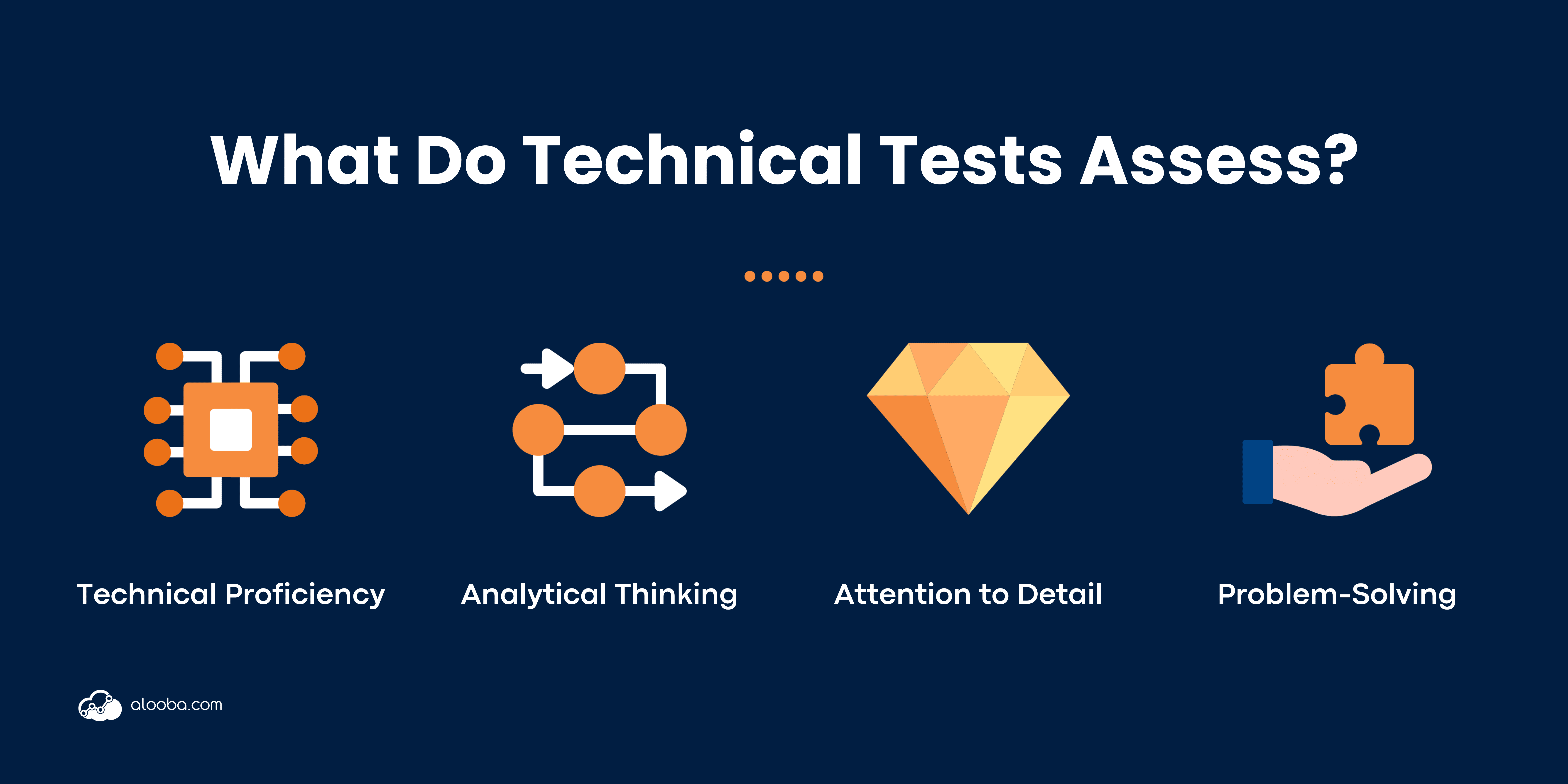
Technical skills assessments are targeted evaluations designed to measure a candidate's proficiency in specific technical areas relevant to the job role. These assessments can take various forms, including coding challenges, multiple-choice questions, or scenario-based problems.
Unlike theoretical questions, these assessments provide a practical and reliable way to gauge a candidate's ability to perform real-world tasks and provide a standardised and objective way to gauge a candidate's technical abilities.
What do Technical Tests Measure
Although topics in technical tests may vary between industries, departments, and roles within a company, the core technical skills employers assess often remain consistent. These skills include:
- Technical Proficiency: Deep understanding of relevant technologies and their applications.
- Analytical Thinking: The ability to break down problems, identify key factors, and develop solutions.
- Attention to Detail: Creating thorough, well-organised, and error-free work.
- Problem-Solving: The ability to identify, analyse, and implement effective solutions to complex challenges.
What Types of Technical Tests Are There?
Coding Tests: These tests evaluate a candidate's ability to write code in a specific programming language. They may involve solving coding challenges, algorithms, or implementing functionalities within a limited timeframe.
Take-Home Projects: Candidates are given a project to complete on their own time and submit within a specified timeframe. This assesses their problem-solving skills, software development expertise, and ability to work independently.
Technical Interviews with Live Coding: These combine traditional interview questions with live coding exercises. The interviewer observes how the candidate approaches problems, writes code, and explains their thought process.
Online Assessments: These computer-delivered tests assess a range of technical skills, including multiple-choice questions, code snippets analysis, or short coding challenges.
What About Coding Tests? What do Coding Tests Measure?
Coding tests are essential tools for evaluating a candidate's programming skills and problem-solving abilities. These tests simulate real-world coding scenarios, allowing candidates to demonstrate their technical proficiency in a controlled environment.
By using coding tests, hiring managers can gain valuable insights into how candidates approach problems, write code, and optimise solutions, ensuring they have the necessary skills for technical roles.
Coding tests measure a variety of skills and abilities, including:
- Technical Proficiency: Mastery of specific programming languages and coding best practices.
- Algorithmic Thinking: The ability to devise efficient solutions to complex problems.
- Code Quality: Writing clean, maintainable, and well-documented code.
- Problem-Solving: The ability to break down complex problems and implement effective solutions.
Examples of Coding Test Scenarios
Data Analysis with Python: Writing a Python script to clean, analyse, and visualise a dataset, demonstrating proficiency with libraries such as Pandas, NumPy, and Matplotlib. This might include tasks like identifying trends, generating summary statistics, or creating visualisations.
Statistical Analysis with R: Creating R scripts to perform data cleaning, statistical analysis, and visualisation. Candidates will be expected to show their ability to use packages such as dplyr, ggplot2, and tidyr, with tasks including hypothesis testing, regression analysis, or producing detailed visualisations.
SQL Query Writing: Constructing complex SQL queries to retrieve and manipulate data from a provided database schema. Candidates might be asked to write queries that join multiple tables, filter data based on specific criteria, or aggregate results.
Purpose and Advantages of Technical Tests
Technical tests are vital in the hiring process as they provide a standardised and objective method to evaluate a candidate's skills. They ensure that candidates not only possess the necessary technical knowledge but can also apply it effectively in real-world scenarios. By incorporating technical tests into the hiring process, companies can significantly:
- Enhance Candidate Quality: Technical tests assess practical skills and problem-solving, ensuring only the most qualified candidates with the right skillset progress.
- Improve Job Fit: Accurate technical assessments help match candidates to roles that align with their strengths, boosting job satisfaction and retention.
- Boost Team Productivity: Hiring candidates with proven technical skills elevates team productivity by enabling efficient collaboration and effective project completion.
Technical Skills Assessed on Alooba
Python is a versatile and beginner-friendly programming language widely used for data analysis, machine learning, and web development. It's clear syntax and extensive libraries make it a popular choice for a variety of tasks.
Python's versatility shines in various real-world applications, such as in:
-
Data Analysis and Manipulation: Python can be used to analyse a dataset, clean the data, and perform various manipulations using libraries like pandas and NumPy.
-
Web Scraping: A common scenario involves extracting data from a website using libraries such as BeautifulSoup or Scrapy. This demonstrates the ability to gather and process online data.
-
API Integration: The task might involve integrating and utilising APIs to fetch, process, and display data. This showcases the ability to work with external data sources and services.
To assess Python proficiency, common areas of focus include:
-
Data Collection and Cleaning: Using libraries like pandas to read, clean, and manipulate data and handling missing data and outliers effectively.
-
Algorithmic Thinking: Solving problems using algorithms and understanding their complexity. Implementing sorting, searching, and other fundamental algorithms.
-
Libraries and Frameworks: Using Python libraries such as NumPy, pandas, and scikit-learn. Understanding how to leverage these tools for data science and machine learning tasks.
Alooba offers tests that assess Python through our:
-
Concepts & Knowledge Tests: Assess candidates’ understanding of Python's core concepts, syntax, and best practices.
-
Data Analysis Tests: Evaluate how candidates use Python for data analysis, including data cleaning, manipulation, and visualisation.
-
Analytics Coding Tests: Test candidates' coding abilities in a dedicated Python coding environment, focusing on their problem-solving skills and ability to write efficient, clean code.
R is a powerful open-source programming language specifically designed for statistical computing and data visualisation. It's a go-to choice for statisticians, data scientists, and researchers due to its advanced statistical capabilities and rich graphical packages.
R excels in data analysis and offers functionalities for:
- Data Analysis and Visualisation: Analyse datasets, perform statistical tests, and create visualisations using packages like ggplot2 and tidyverse.
- Statistical Modelling: Building and evaluating statistical models to make data-driven predictions and insights is a common task in R.
- Data Cleaning and Preparation: R allows users to clean, transform, and prepare data for analysis, making it adept at handling real-world messy data sets.
To assess R proficiency, common areas of focus include:
-
Statistical Analysis: Performing various statistical tests and interpreting the results. Understanding of key statistical concepts and methodologies.
-
Data Manipulation: Using dplyr and other tidyverse packages to manipulate and clean data. Handling large datasets efficiently.
Data Visualization: Creating complex visualisations with ggplot2. Interpreting and presenting data insights effectively.
Alooba offers tests that assess R through our:
- Concepts & Knowledge Tests: Evaluate candidates' understanding of R’s core concepts, syntax, and statistical techniques.
- Data Analysis Tests: Test how candidates use R for data analysis, including data cleaning, statistical modelling, and visualisation.
- Analytics Coding Tests: Assess candidates' coding abilities in a dedicated R coding environment, focusing on their problem-solving skills and ability to write efficient, clean R code.
Read our comprehensive guide to R testing.
SQL (Structured Query Language) is a domain-specific language used to interact with relational databases. It allows you to efficiently retrieve, manipulate, and manage data stored in these databases, making it essential for data analysis, reporting, and web applications.
SQL allows users to manage data through various functionalities, including:
-
Data Retrieval: Extracting relevant data for analysis, like customer purchase history, using SELECT statements.
-
Data Manipulation: Updating records within a database, such as changing a customer's address or status, using UPDATE statements.
-
Database Management: Creating and modifying the structure of databases, like adding new tables or columns, using CREATE and ALTER statements.
To assess SQL proficiency, common areas of focus include:
-
Data Querying: Writing SELECT statements to retrieve specific data from one or more tables. Using JOIN operations to combine data from multiple tables.
-
Data Filtering and Sorting: Applying WHERE clauses to filter data based on specific conditions. Using ORDER BY clauses to sort the retrieved data.
-
Aggregation and Grouping: Utilising GROUP BY and HAVING clauses to aggregate data and perform calculations such as sums, averages, and counts.
Alooba offers tests that assess SQL through our:
-
Concepts & Knowledge Tests: Assess candidates’ understanding of SQL syntax, concepts, and basic queries.
-
SQL Test: candidates will be asked to write a series of SQL statements to query a common database schema.
Read our comprehensive guide to SQL testing.
- Algorithms
- Analytics Programming
- APIs
- Chart Interpretation
- CSS
- Data Governance
- Data Literacy
- Data Management
- Data Modelling
- Data Science
- Deep Learning
- DevOps
- Digital Marketing Analytics
- Functional Programming
- Google Analytics
- Hadoop
- Internet Security
- Java
- JavaScript
- Machine Learning
- Microsoft Excel
- Natural Language Processing
- Neural Networks
- Object-Oriented Programming
- Product Analytics
- Programming Concepts
- Prompt Engineering
- Relational Databases
- Reports & Visualisations
- Sales
- Sales Analytics
- Scala
- Software Development Life Cycle
- Software Engineering
- Statistics
- Systems Architecture
Roles to Consider Using Technical Tests For
Data Scientist
A Data Scientist is an advanced analytical professional who utilizes statistical methods, machine learning, and data visualization techniques to extract insights from complex datasets. They play a pivotal role in driving innovation and strategic decision-making through data-driven solutions.
Software Engineer
A Software Engineer is a technical expert who designs, develops, and maintains software systems. They apply programming principles and methodologies to create efficient, scalable, and high-quality software solutions, while collaborating with cross-functional teams to deliver innovative products.
Data Engineer
A Data Engineer is a technical expert who designs, builds, and maintains scalable data pipelines and architectures. They play a critical role in ensuring that data flows seamlessly from various sources to data repositories, enabling organizations to derive insights and make data-driven decisions.
DevOps Engineer
A DevOps Engineer is a pivotal role that bridges the gap between development and operations, enhancing collaboration and productivity through automation and continuous integration. They leverage cloud architecture, automation frameworks, and orchestration tools to ensure scalable, fault-tolerant systems that meet business needs.
Data Analyst
A Data Analyst is a skilled professional who interprets data, identifies trends, and translates insights into actionable business strategies. They are proficient in data analysis tools, statistical methods, and data visualization techniques, providing valuable support for data-driven decision-making.
Machine Learning Engineer
A Machine Learning Engineer is a specialized professional who designs, builds, and deploys machine learning models and systems. They leverage their expertise in algorithms, programming, and data processing to create scalable solutions that enhance business operations and drive innovation.
Cognitive Ability Tests
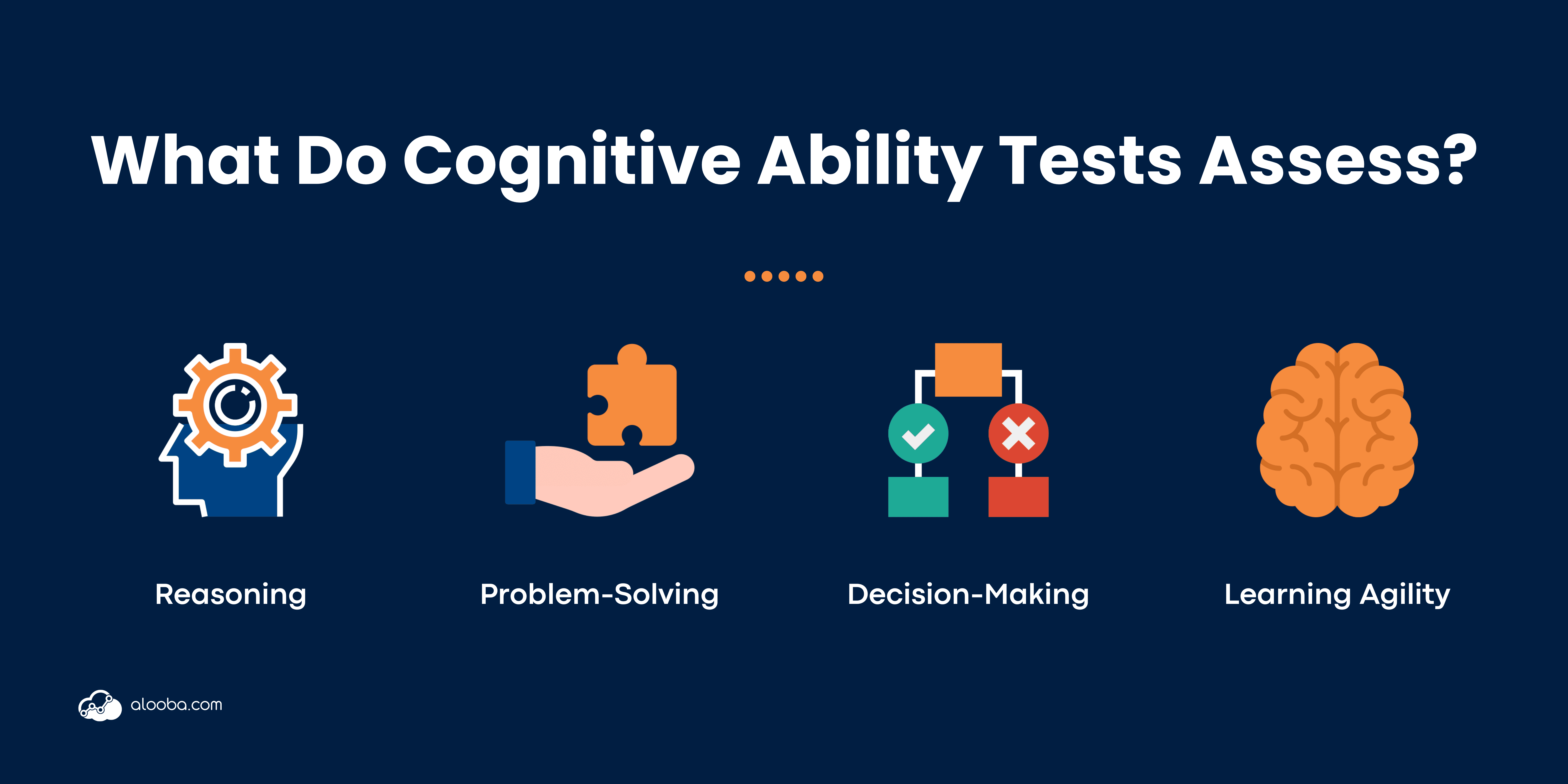
Cognitive ability tests are powerful tools used to assess a candidate's fundamental thinking skills. Imagine a series of puzzles and challenges designed to evaluate reasoning, problem-solving, and information processing. These tests go beyond academic knowledge, revealing a candidate's natural aptitude for learning and adapting.
Hiring managers gain a deeper understanding of a candidate's potential, leading to better hiring decisions and a stronger team.
What Do Cognitive Ability Tests Measure?
These assessments delve into a range of cognitive domains, gauging abilities that are crucial for success across diverse job roles. Here are some key areas these tests explore:
-
Reasoning: Assesses one’s ability to analyse information, identify patterns, and draw logical conclusions. It evaluates how well they can approach challenges, break down problems, and arrive at effective solutions.
-
Problem-Solving: Cognitive ability tests evaluate a candidate's approach to tackling problems. These tests can reveal their ability to think critically, identify key elements of a problem, and formulate creative solutions.
-
Decision-Making: These assessments measure a candidate's ability to weigh options, consider risks and rewards, and make sound decisions under pressure.
-
Learning Agility: Cognitive ability tests can also provide insights into a candidate's capacity to learn new skills and adapt to changing situations. This ability is crucial in today's dynamic work environment.
What Type of Cognitive Abilities Tests are There?
According to Thomas.co, the cognitive tests available can be put into three categories:
Verbal Cognitive Ability
This measures a candidate's understanding and manipulation of language. It assesses abilities such as:
- Reading Comprehension: Can they grasp the meaning and intent of written text?
- Vocabulary: Do they possess a strong understanding of words and their nuances?
- Verbal Reasoning: Can they analyse information presented verbally and identify logical connections?
Nonverbal Cognitive Ability
This domain focuses on problem-solving using visual information. These may involve reading comprehension passages, identifying synonyms and antonyms, or completing analogies. These often use abstract shapes, patterns, or matrices to assess a candidate's visual problem-solving skills. It evaluates skills like:
- Spatial Reasoning: Can they visualise and manipulate objects in three dimensions?
- Pattern Recognition: Can they identify patterns and sequences in visual data?
- Abstract Thinking: Can they understand and apply complex concepts without relying on language?
Numerical Cognitive Ability
This assesses a candidate's aptitude for working with numbers and data. These tests typically involve calculations, data interpretation, and word problems with a numerical focus. It evaluates abilities like:
- Numerical Computation: Can they perform calculations accurately and efficiently?
- Data Analysis: Can they interpret numerical data and draw meaningful conclusions?
- Estimation: Can they make educated guesses about quantities and values?
Examples of Cognitive Ability Test Scenarios
- Verbal Reasoning Test: Candidates may be presented with passages of text and asked to draw conclusions or identify logical relationships.
- Spatial Reasoning Test: Assessing the ability to manipulate shapes or visualise objects in space to solve problems.
- Numerical Reasoning Test: Involving data analysis tasks, including interpreting graphs, performing calculations, or solving mathematical puzzles.
Purpose and Advantages of Cognitive Ability Tests
Cognitive ability tests are designed to measure a candidate’s intellectual capabilities, providing a comprehensive assessment of their thinking skills, problem-solving abilities, and overall cognitive function. Using this approach to test candidates may help:
- Predict Job Performance: Identify candidates who excel in complex roles by assessing their problem-solving and critical thinking skills.
- Identify Learning Agility: Uncover individuals who can readily adapt to changing environments by measuring their ability to learn and apply new skills.
- Improve Team Fit: Match candidates to roles that align with their intellectual strengths, leading to higher job satisfaction, better performance, and reduced turnover.
Cognitive Abilities Assessed on Alooba
Analytical Mindset refers to the ability to approach problems and situations logically and systematically. Individuals with an analytical mindset excel at critical thinking, allowing them to effectively:
-
Gather, Analyze, and Interpret Information: They can collect relevant data, identify patterns and trends, and draw meaningful conclusions.
-
Make Well-Informed Decisions: Their analytical skills enable them to consider various options and choose the best course of action based on evidence.
-
Solve Complex Problems Efficiently: By breaking down issues and applying logical reasoning, they can find effective solutions.
Alooba offers tests that assess ‘Analytical Mindset’ through our:
-
Concepts & Knowledge Tests: Evaluate understanding of analytical principles through multiple-choice tests.
-
Data Analysis Tests: Assess practical data interpretation skills through hands-on exercises.
-
SQL Tests: Evaluate proficiency in querying and manipulating data using SQL statements.
-
Analytics Coding Tests: Assess ability to analyse and manipulate data programmatically using Python or R.
Cognitive biases significantly impact decision-making, leading to errors and suboptimal choices. Assessing candidates' awareness of these biases provides insights into their:
-
Decision-Making: Ability to recognize and mitigate biases for rational choices.
-
Problem-Solving: Aptitude for identifying and overcoming biases for effective solutions.
-
Critical Thinking: Capacity to analyse information objectively and consider alternative viewpoints.
Alooba offers tests that assess ‘Cognitive Biases’ through our:
-
Concepts & Knowledge Tests: Multiple-choice quizzes test core subtopics of cognitive biases.
-
Free Response Tests: Open-ended questions delve deeper into a candidate's comprehension and gain insights into their opinions on relevant areas.
Inductive Reasoning is a critical cognitive ability that allows individuals to draw general conclusions based on specific observations. These decision-making skills are seen through:
-
Observation & Pattern Recognition: Identifying patterns and trends in specific examples forms the foundation for inductive reasoning.
-
Formulating Hypotheses: Based on observed patterns, an educated guess about the underlying principle is formed.
-
Testing & Refining Hypotheses: Rigorous testing through additional observations and experimentation ensures accurate conclusions.
Alooba offers tests that assess ‘Inductive Reasoning’ through our:
-
Concepts & Knowledge Tests: Multiple-choice questions test understanding of core inductive reasoning principles. (e.g., identifying patterns in data sets, formulating hypotheses)
-
Data Analysis Tests: Analyse small datasets to identify patterns and answer questions related to those patterns.
-
Free Response Tests: Open ended questions encourage candidates to explain their reasoning process when reaching conclusions based on presented information.
Numerical Reasoning is a cognitive ability that allows individuals to analyse and interpret numerical information to solve problems and make data-driven decisions. Individuals that have strong numerical reasoning ability tend to have strong:
-
Mathematical Comprehension: Understanding mathematical concepts and operations is foundational for applying them to solve problems.
-
Analytical Thinking: Critically assessing data, identifying patterns, and using logic to reach solutions are vital aspects.
-
Decision-Making: Interpreting data and drawing insights to make informed choices based on quantitative evidence.
Alooba offers tests that assess ‘Numerical Reasoning’ through our:
-
Data Analysis Tests: Analyse small datasets to identify patterns, trends, and answer related questions.
-
Free Response Tests: Open ended questions encourage candidates to explain their reasoning process when reaching conclusions based on presented numerical data.
Problem-Solving is a crucial skill for identifying and resolving complex issues effectively. It involves analysing problems, devising solutions, and implementing the most suitable one through:
-
Problem Identification: Recognize challenges, define problems, and clarify objectives.
-
Critical Thinking: Analyse information objectively, identify assumptions, and make sound judgments.
-
Analytical Reasoning: Break down problems, examine relationships, and identify patterns.
-
Creative Thinking: Generate innovative solutions by thinking outside the box.
Alooba offers tests that assess ‘Problem Solving’ through our:
-
Data Analysis Tests: Analyse datasets to identify patterns and answer related questions.
-
Free Response Tests: Explain reasoning processes when reaching conclusions based on presented information.
Strategic Thinking is the ability to analyse, evaluate, and make critical decisions to achieve long-term goals. Using a proactive and future-oriented approach to decision-making, strategic thinkers usually have:
-
Big Picture Focus: Analyses situations from a broad perspective, prioritising long-term success.
-
Opportunity & Risk Management: Identifies opportunities, mitigates risks, and creates competitive advantages.
-
Adaptability: Adjusts to dynamic environments, navigating complexities with confidence.
Alooba offers tests that assess ‘Strategic Thinking’ through our:
- Free Response Tests: Analyse complex scenarios, think critically, and communicate strategic ideas effectively through written responses or essays.
This is the ability to understand and analyse written and spoken language. Key components include:
-
Vocabulary: A broad and diverse vocabulary is essential.
-
Reading Comprehension: The ability to grasp meaning from written materials is crucial.
-
Analogical Reasoning: Identifying relationships between words and concepts is key.
-
Logical Deduction: Applying logical thinking to solve problems is necessary.
-
Verbal Fluency: The ability to express ideas clearly and coherently is important.
Alooba offers tests that assess ‘Verbal Reasoning’ through our:
- Free Response Tests: Describe a situation where you had to analyse complex information and explain your thought process.
Roles to Consider Using Cognitive Abilities Tests For
Product Manager
A Product Manager is a strategic leader responsible for guiding the development and lifecycle of a product from conception to launch. They collaborate with cross-functional teams, prioritize features, and ensure that the product meets customer needs while aligning with business objectives.
Financial Analyst
A Financial Analyst is a skilled professional who evaluates financial data, conducts analysis, and provides insights to support strategic financial decision-making. They utilize a variety of analytical tools and techniques to assess financial performance and forecast future trends, playing a pivotal role in guiding business strategies.
Operations Analyst
An Operations Analyst is a detail-oriented professional who analyzes and improves organizational processes to enhance efficiency and effectiveness. They utilize data analysis, statistical techniques, and lean methodologies to identify operational issues and implement solutions that drive business performance.
Decision Scientist
Decision Scientists use advanced analytics to influence business strategies and operations. They focus on statistical analysis, operations research, econometrics, and machine learning to create models that guide decision-making. Their role involves close collaboration with various business units, requiring a blend of technical expertise and business acumen. Decision Scientists are key in transforming data into actionable insights for business growth and efficiency.
Personality Tests
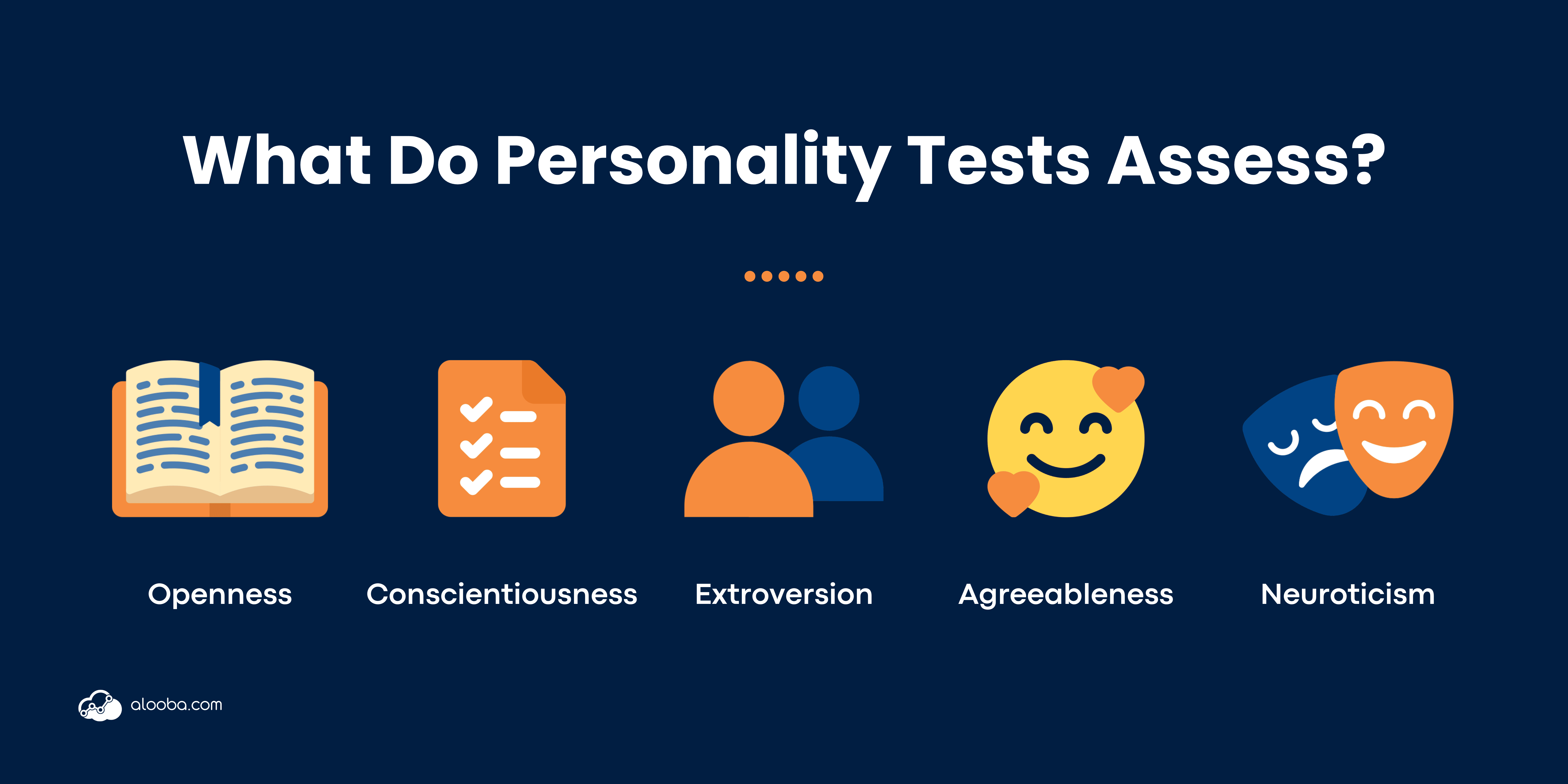
Personality tests help gain insights into a candidate's motivations, work style, and cultural fit. Unlike traditional assessments with right or wrong answers, personality tests provide a personality profile, revealing unique strengths and tendencies.
What Type of Personality Tests are There?
- Big Five Personality Test: Measures personality across five dimensions: Openness, Conscientiousness, Extraversion, Agreeableness, Neuroticism. Provides a trait profile instead of types.
- Myers-Briggs Type Indicator (MBTI): Categorises personalities into 16 types based on preferences in perceiving the world and making decisions.
- DISC Assessment: Identifies communication styles and behaviour (Dominant, Influential, Supportive, Cautious).
- Enneagram Personality Test: Delves deeper into motivations, fears, strengths, and growth opportunities for nine personality types. Used for coaching and therapy.
What Do Personality Tests Measure?
At Alooba, we use the Big Five Personality Test, a scientifically validated framework that provides valuable insights into a candidate's core characteristics. The Big Five Personality Tests reveals:
Openness to Experience: This measures a candidate's imagination, curiosity, and eagerness to learn and try new things. Are they innovative thinkers who thrive in dynamic environments?
Conscientiousness: This assesses an individual's focus, organisation, and ability to plan and follow through on tasks. Do they prioritise deadlines, possess a strong work ethic, and bring structure to the team?
Extraversion: This explores a person's level of energy and sociability. Are they outgoing and energised by collaborating with others, or more introverted, preferring focused work periods?
Agreeableness: This indicates a candidate's cooperativeness, empathy, and ability to work effectively within a team. Are they diplomatic and build strong relationships, or more assertive and independent?
Neuroticism: This assesses emotional stability and resilience. Are they calm under pressure and adaptable to change, or prone to anxiety and stress?
Purpose and Advantages of Personality Tests
Alooba uses the Big Five personality test to find the best fit. This scientifically validated tool helps us understand how candidates align with our values and team dynamics. We can then see if there is:
-
Fit with Organisational Culture: How well candidates align with our company values and work environment.
-
Team Collaboration: Potential contributions to team dynamics, balancing strengths and interpersonal dynamics.
-
Potential Personal and Professional Growth: Opportunities for development and leveraging strengths in the role.
Personality Traits Assessed on Alooba (The Big 5 Personality)
Openness reflects intellectual curiosity, a thirst for new experiences, and an appreciation for creativity.
Hiring individuals with high openness benefits your organisation in several ways:
-
Enhanced Innovation: Open employees bring fresh perspectives, readily explore new ideas, and contribute to a dynamic work environment.
-
Stronger Adaptability: They thrive in changing landscapes, readily adjusting to new challenges and embracing continuous improvement.
-
Diverse & Engaged Teams: Their openness fosters collaboration with diverse personalities and contributes to a rich team culture.
Alooba offers tests that assess ‘Openness to Experience’ through our:
-
Personality Profiling Tests: Gauge understanding of openness-related topics like curiosity and artistic appreciation.
-
Free Response Tests: Evaluate creativity and openness to expression.
Conscientiousness reflects an individual's dedication to goals, discipline, and a strong work ethic. Conscientious individuals are:
-
Highly Organised: They prioritise structure, planning, and meeting deadlines with meticulous attention to detail.
-
Dependable & Reliable:: Their strong work ethic ensures consistent performance, adherence to commitments, and a focus on quality output.
-
Self-Disciplined & Goal-Oriented: They exhibit strong initiative, take ownership of tasks, and actively pursue achievement.
Alooba offers tests that assess ‘Conscientiousness’ through our:
-
Personality Profiling Tests: Gauge understanding of conscientiousness-related topics like discipline and organisation.
-
Free Response Tests: Gauge an Individual’s preparedness, communication style, and responsible approach to the interview process.
Extroversion reflects an individual's preference for external engagement, social interaction, and collaboration.
Hiring highly extroverted individuals benefits your organisation in several ways:
-
Strong Communication & Collaboration: Their energy and enthusiasm foster effective communication, teamwork, and a positive work environment.
-
Client & Stakeholder Engagement: They excel in roles requiring frequent interaction with clients, colleagues, and external stakeholders.
-
Diverse & Balanced Teams: Understanding extroversion helps build balanced teams where different communication styles and personalities complement each other.
Alooba offers tests that assess ‘Extroversion’ through our:
-
Personality Profiling Tests: Gauge understanding of extroversion-related topics like engagement and collaboration.
-
Free Response Tests: In-depth evaluations assess communication skills, social engagement, and assertiveness.
Agreeableness, a core aspect of the Big Five personality model, reflects an individual's desire for cooperation, harmony, and positive social interactions.
Hiring highly agreeable individuals benefits your organisation in several ways:
-
Enhanced Teamwork & Collaboration: Their cooperative nature fosters positive team dynamics, promotes effective communication, and contributes to a supportive work environment.
-
Stronger Conflict Resolution: They approach disagreements with a willingness to compromise, seeking solutions that benefit everyone.
-
Exceptional Client Service: High agreeableness translates to better customer service through empathy, strong interpersonal skills, and a focus on building positive relationships.
-
Leadership Potential: Agreeable individuals can be effective leaders who value team spirit, prioritise inclusivity, and cultivate a harmonious work environment.
Alooba offers tests that assess ‘Agreeableness’ through our:
-
Personality Profiling Tests: Gauge understanding of agreeableness-related topics like teamwork and conflict-resolution.
-
Free Response Tests: Evaluate responses in situations requiring empathy, negotiation, and social awareness.
Neuroticism reflects an individual's tendency to experience negative emotions like anxiety and anger.
Understanding a candidate's neuroticism level offers valuable insights:
-
Stress Management: Identify individuals who can effectively manage stress, maintain composure, and perform well under pressure.
-
Emotional Stability: Evaluate a candidate's propensity for emotional reactivity and their ability to manage conflict constructively.
-
Team Dynamics: Assess potential for emotional stability within the team environment, fostering a more positive and productive work culture.
Alooba offers tests that assess ‘Agreeableness’ through our:
-
Personality Profiling Tests: Gauge understanding of neuroticism-related topics like stress management and emotional stability.
-
Free Response Tests: Evaluate body language, communication style, and emotional responses during recorded video interviews.
- Assertiveness: Indicates a person's ability to confidently express their needs and opinions.
- Compassion: Measures the capacity to understand and share the feelings of others.
- Emotional Intelligence: Evaluates a person's ability to manage their own emotions and understand the emotions of others.
- Politeness: Reflects a consideration for others' feelings and a tendency to avoid conflict.
Roles to Consider Using Personality Tests For
Product Manager
A Product Manager is a strategic leader responsible for guiding the development and lifecycle of a product from conception to launch. They collaborate with cross-functional teams, prioritize features, and ensure that the product meets customer needs while aligning with business objectives.
Marketing Analyst
A Marketing Analyst is a data-driven professional who analyzes market trends, consumer behavior, and campaign performance to inform marketing strategies. They leverage statistical techniques and data visualization tools to provide actionable insights that enhance marketing effectiveness and drive business growth.
UX Analyst
UX Analysts focus on understanding user behaviors, needs, and motivations through observation techniques, task analysis, and other feedback methodologies. This role is pivotal in bridging the gap between users and development teams, ensuring that user interfaces are intuitive, accessible, and conducive to a positive user experience. UX Analysts use a variety of tools and methods to collect user insights and translate them into actionable design improvements, working closely with UI designers, developers, and product managers.
Product Owner
A Product Owner is a key stakeholder in the product development process, responsible for defining the vision, managing the product backlog, and ensuring that the development team delivers value to the business. They act as a bridge between stakeholders and the development team, prioritizing features based on business needs and customer feedback.
Behavioural Tests
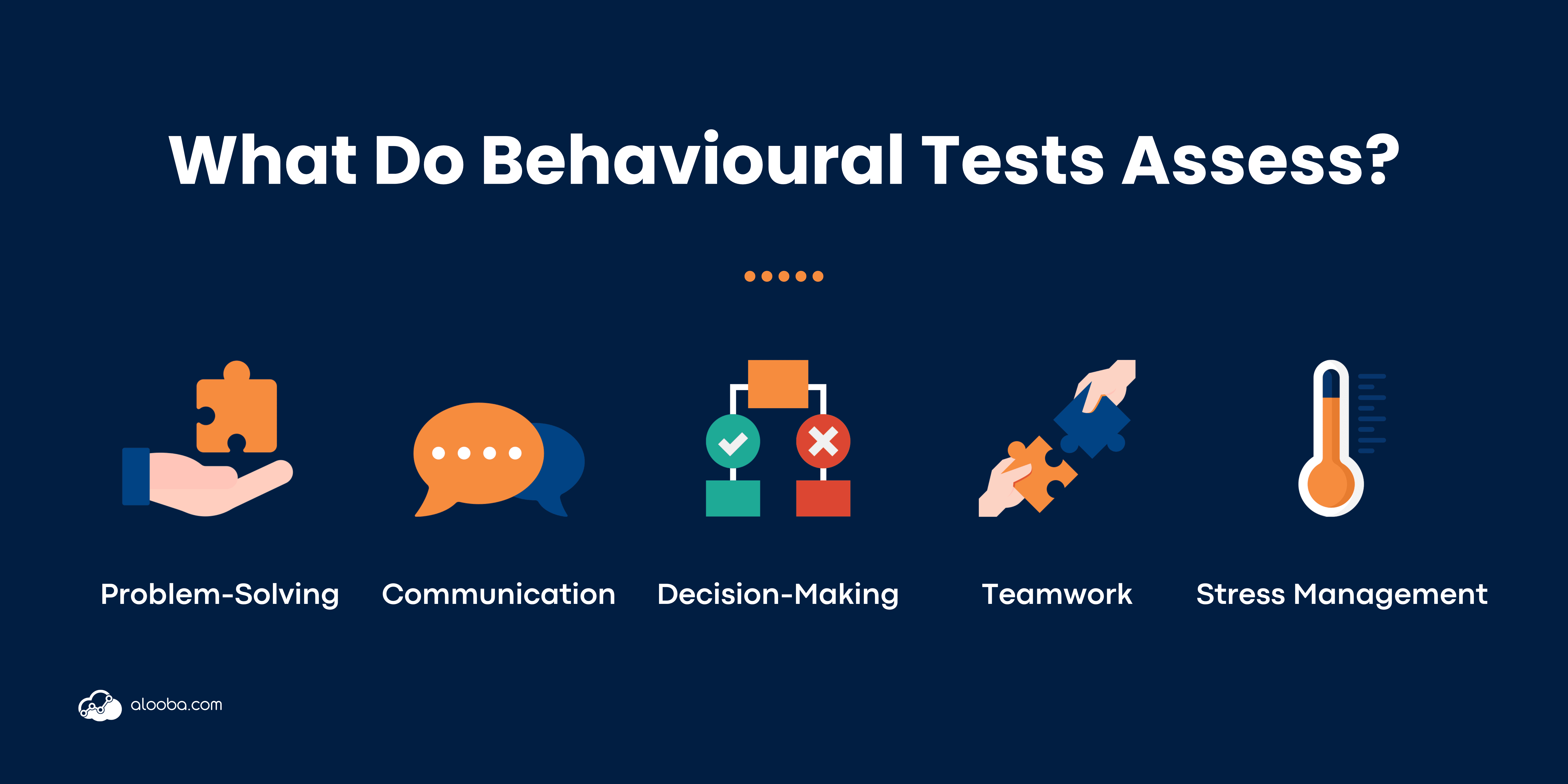
Behavioural assessments are a powerful tool that focus on skills or knowledge. These assessments delve into a candidate's underlying behaviours and how they might translate into on-the-job performance. Behavioural tests provide valuable insights into a candidate's work style, decision-making process, and approach to challenges.
What Do Behavioural Tests Measure?
Behavioural assessments explore a candidate's behavioural tendencies across several key areas:
- Problem-solving: How does the candidate approach challenges? Are they analytical and methodical, or do they thrive in fast-paced, creative problem-solving environments?
- Communication: Can the candidate clearly articulate their ideas both verbally and in writing? Are they adept at collaborating and building consensus?
- Teamwork: Does the candidate prioritise collaboration and supporting their colleagues? How do they handle conflict within a team?
- Decision-Making: Can the candidate make sound decisions under pressure? Do they weigh different perspectives before making a choice?
- Stress Management: How does the candidate react to challenging situations? Do they remain calm and focused, or are they prone to anxiety and emotional distress?
What Types of Behavioral Tests Are There?
There are several types of behavioural assessments, each offering a unique perspective:
- Situational Judgment Tests (SJTs): These present candidates with realistic work scenarios and ask them to choose the most effective course of action. This reveals their decision-making process and alignment with company values.
- Work Sample Tests: Candidates complete tasks that mimic real-world job duties, providing a direct glimpse into their skills and problem-solving abilities relevant to the specific role.
- Biographical Inventories: Candidates answer questions about past experiences and behaviours in similar work settings. This helps identify patterns and predict how they might react in future situations.
- Projective Tests: Less structured than other forms, these tests use ambiguous stimuli like pictures or stories. The candidate's interpretations reveal underlying personality traits and thought processes.
Purpose and Advantages of Behavioural Tests
Behavioural assessments uncover a candidate's natural tendencies and how they handle real-world situations, while providing insight into how a candidate may align with the company’s culture and values.
Behavioural Traits Assessed on Alooba
Adaptability displays an individual’s ability to adjust in different situations, environments, or circumstances. Adaptable individuals display qualities like:
-
Flexibility: They embrace alternative approaches instead of clinging to rigid routines.
-
Resilience: They learn from mistakes, stay positive, and use challenges as stepping stones for improvement.
-
Open-mindedness: They actively seek opportunities to learn and grow by embracing different viewpoints and approaches.
Alooba offers tests that assess ‘Adaptability’ through our:
- Free Response Tests: Open-ended questions delve deeper into an individual's comprehension and ability to analyse situations, revealing adaptability in problem-solving and critical thinking.
Attention to detail involves carefulness, vigilance, and a systematic approach to ensure accuracy and completeness. This skill is valuable in roles where precision and quality are paramount. Individuals tend to have:
-
Organisation and Time Management: They prioritise tasks, create systematic workflows, and manage time effectively.
-
Visual Perception: They possess a keen eye for detail and can accurately interpret visual cues.
-
Analytical and Critical Thinking: They analyse information thoroughly, identify patterns, and make well-reasoned decisions.
Alooba offers tests that assess ‘Attention to Detail’ through our:
- Free Response Tests: Open-ended questions reveal an individual's approach to challenges and their comfort level with unfamiliar situations, which can reflect their meticulousness.
The ability of individuals to work together towards a shared goal, leveraging their diverse talents, skills, and perspectives to achieve success. For great collaboration, individuals usually succeed in promoting:
-
Interpersonal Relationships: They build rapport, develop empathy, and foster positive team dynamics.
-
Teamwork: They value different viewpoints and work cohesively towards shared objectives.
-
Task Delegation: They recognize strengths and delegate tasks efficiently to optimise team productivity.
Alooba offers tests that assess ‘Collaboration’ through our:
- Free Response Tests: Assess communication skills and ability to collaborate within a video format.
The ability of resolving disagreements or disputes constructively in both personal and professional settings. Individuals who excel in conflict management usually display the ability to:
-
Negotiation: They can bargain and discuss to reach mutually agreeable solutions.
-
Compromise: They understand the importance of flexibility and are willing to adjust their stances for a common good.
-
Openly Communication: They encourage open expression of views, listen attentively, and ensure everyone feels heard.
Alooba offers tests that assess ‘Conflict Management’ through our:
- Free Response Tests: Provides a deeper look at practical application through scenario-based questions where candidates demonstrate their approach to conflict resolution in real-world situations.
The ability to understand and share the feelings of others, allowing one to see the world from their perspective and experience their emotions as if they were your own. Empathetic individuals usually have:
-
Active Listening: They pay close attention to what others are saying, both verbally and nonverbally.
-
Open-mindedness: They are receptive to different viewpoints and experiences.
-
Emotional Intelligence: They understand and manage their own emotions, as well as recognize and respond to the emotions of others.
Alooba offers tests that assess ‘Empathy’ through our:
- Free Response Tests: Candidates respond to scenarios requiring empathy, revealing their understanding of emotional responses and ability to address them constructively.
Individuals with leadership qualities are able to inspire, motivate, and guide others toward achieving a common goal. Great leader have the ability to:
-
Influence: They inspire and guide team members, not dictate.
-
Direct Vision: They have a clear direction and inspire others to share it.
-
Make Decisions: They make quick, effective choices even under pressure.
Alooba offers tests that assess ‘Leadership’ through our:
- Free Response Tests: Provides insights into communication style, decision-making, and motivation through pre-recorded video responses.
Team building is the process of creating a cohesive and high-performing team. It involves activities that bring individuals together, fostering collaboration, communication, and a shared vision towards a common goal. Individuals that excel in team building additionally excel in:
-
Communication: Team building activities encourage open dialogue and active listening, strengthening communication skills and reducing misunderstandings.
-
Collaboration: Working together on shared tasks fosters teamwork, idea sharing, and improved problem-solving.
-
Growing Trust and Relationships: Building trust is crucial for effective teamwork. Team building exercises create opportunities for bonding and developing strong professional relationships.
Alooba offers tests that assess ‘Team Building’ through our:
- Free Response Tests: Candidates answer team building-related questions through video responses. This provides insights into their communication skills, problem-solving abilities, and overall approach to working in a team.
Roles to Consider Using Behaviour Tests For
Product Manager
A Product Manager is a strategic leader responsible for guiding the development and lifecycle of a product from conception to launch. They collaborate with cross-functional teams, prioritize features, and ensure that the product meets customer needs while aligning with business objectives.
Operations Analyst
An Operations Analyst is a detail-oriented professional who analyzes and improves organizational processes to enhance efficiency and effectiveness. They utilize data analysis, statistical techniques, and lean methodologies to identify operational issues and implement solutions that drive business performance.
Product Owner
A Product Owner is a key stakeholder in the product development process, responsible for defining the vision, managing the product backlog, and ensuring that the development team delivers value to the business. They act as a bridge between stakeholders and the development team, prioritizing features based on business needs and customer feedback.
Sales Analyst
A Sales Analyst is a data-driven professional who analyzes sales data to identify trends, forecast future sales, and provide actionable insights that drive business growth. They leverage statistical analysis, market research, and data visualization techniques to support sales strategies and improve overall performance.
Make Assessments a Part of Your Hiring Process
These assessments allow you to gain a deeper understanding of your candidates, and by incorporating a variety of assessments into your recruiting process, you can move beyond simply filling a position and build a team of well-rounded individuals who excel in their roles.




